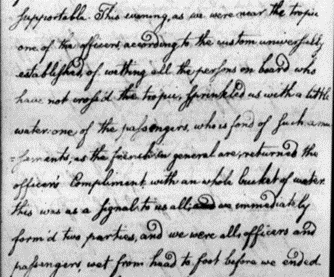By Gwen Fries, Adams Papers
In the summer of 1785, John Quincy Adams was trapped on a ship slowly making its way across the too-still waters of the Atlantic. The eighteen-year-old was leaving behind Europe, his parents, and his friends, to return to Massachusetts and to his father’s alma mater, Harvard College.
Four days into his journey, on 25 May, Adams bemoaned relentless seasickness, static landscapes, and indifferent companions. “The Events that happen on board a Vessel are very seldom interesting, and the life we lead is very lazy and tiresome. Our Company on board . . . is not in general such as I should have wished.”
One of the crew, Mr. Well de Singler, was the same age as John Quincy, but friends they were not. “His manners are by no means agreeable. . . He is full of his knowledge, and does not doubt but he is the most learned man on board though the youngest. He commonly engroces the conversation wherever he is, and maintains his opinion in the most positive manner, upon any subject whatever. His principles are to fight with every body, and upon the most trivial occasions; he even gives to understand, that if opportunities fail, he takes care to create them. He pretends to be of noble birth and affects to despise every body who is not noble. In short I think it an unlucky circumstance that I am obliged to remain with him during 50 days.”
If the lack of agreeable company and interesting sights weren’t enough to make the journey feel endless, nature itself was against him. On most days the wind stood completely still and they made very little progress. When the wind did blow, it blew “directly contrary” to what the sails needed. “Our Wind has been very low for several days. 15 or 20 leagues a day is the utmost extent of our route,” Adams lamented to his diary.
Twenty-three days into the voyage, cabin fever had set in in a big way. “This forenoon,” Adams wrote, “we saw something at Sea, but we could not distinguish what. Some said it was a very large piece of wood. Others, were of opinion, that it was a boat overset. It pass’d at a small distance, and amused us for half an hour. At Sea, such is the continual sameness of the surrounding objects that the smallest trifle becomes interesting.”
Halfway through the odious odyssey, Adams and his fellow passengers had had enough of the baking sun. “We would willingly agree to have less Sun, and more wind,” he complained. “This evening, as we were near the tropic one of the officers, according to the custom universally established, of wetting all the persons on board who have not cross’d the tropic, sprinkled us with a little water.”
To break up the monotony, “one of the passengers, who is fond of such amusements; as the french in general are; returned the officer’s Compliment, with an whole bucket of water.”

“This was as a signal to us all,” John Quincy recorded. He and all the other passengers—scholars, physicians, merchants, and officers, Dutch, Swedish, French, and American—“immediately form’d two parties, and we were all, officers and passengers, wet from head to foot before we ended. I believe more than 200 buckets of water were spilt upon the deck in the course of the evening. One of the passengers alone receiv’d thirty buckets.”
If you think connecting with his inner child and having a water fight was out of character for John Quincy Adams…you’d be right. “Such a diversion is not very instructive nor very agreeable, but may be pass’d over for once: I hope it will not be repeated.”
The Adams Papers editorial project at the Massachusetts Historical Society gratefully acknowledges the generous support of our sponsors. Major funding for the John Quincy Adams Digital Diary was provided by the Amelia Peabody Charitable Fund, with additional contributions by Harvard University Press and a number of private donors. The Mellon Foundation in partnership with the National Historical Publications and Records Commission also supports the project through funding for the Society’s digital publishing collaborative, the Primary Source Cooperative.

